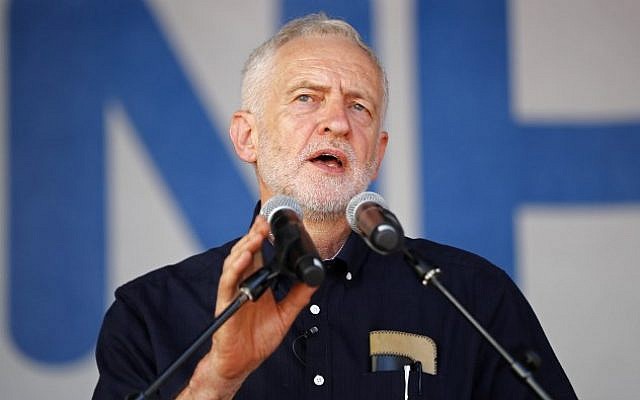Anti-Semitism, a Stranger in UK Labour
"They can falsify social media very easily. And some of these people in the Jewish community support Trump, they are Trump fanatics and all the rest of it."
"So I am not going to be lectured to by Trump fanatics making up duff [invalid] information without any evidence at all."
"So I think we should ask the 70 rabbis ‘where is your evidence of severe and widespread antisemitism in this Party?’"
"Let me ask you, let me ask you a question how many people in this room have seen anti-Semitism in the Labour Party?"
"Put your hands up…one, two – you’ve had anti-Semitism in the Labour Party? I’m amazed. I’ve certainly never seen it."
Peter Willsman, member, Labour Democracy group
 |
| Jeremy Corbyn questioned the destruction of Kalen Ockerman’s mural of Jewish bankers in 2012 MICHAEL KEMP/ALAMY |
All three of these British Jewish newspapers, to emphasize the reality of the situation published the very same commentary on their front pages under the headline "United We Stand" to protest the decision taken by Labour to withdraw from a passage on Israel taken from an internationally accepted definition of anti-Semitism the party had incorporated into its official code of conduct, thereby rendering the passage anodyne and toothless. It half-dedicates itself to the recognition of anti-Semitism; the declaration, incomplete is worthless.
The Labour Party has become particularly skilled in denying ulterior motives, much less that it harbours one iota of ill will to Jews. Indeed, the Labour Party poses "no threat of any kind whatsoever to Jewish people", remaining "committed to tackling and eradicating anti-Semitism in all its forms". Corbyn, by his very alliances; friendly relations with terrorist groups such as Hamas as fellow travellers, has made it quietly 'respectable' to criticize Israel, while courting the Jewish vote.
The British Labour Party has traditionally been the natural political home of British Jews who tend to lean left. Demonstrators protested outside Parliament in March to inform Parliament that Jews no longer saw themselves welcomed in the party, even before the revelation that Corbyn had personally endorsed an anti-Semitic mural, considered part of a celebrated art project, whose design clearly was geared toward traditional slander; the Jew as unscrupulous money-lender.
Labour's national executive committee failed to accept the full text of the working definition of anti-Semitism that the International Holocaust Remembrance Alliance had defined. Of the 11 illustrative examples accompanying the document adopted by Labour, some have been omitted. One defining "claiming that the existence of a state of Israel is a racist endeavour" was in particular rejected, objecting that the definition could unfairly restrict Palestinians or their supporters from describing their misfortune.
Corbyn, insisting on his opposition to all forms of bigotry including anti-Semitism, has long supported Palestinian causes, and has been a vocal critic of many policies of the Israeli government. The three newspapers argued their decision to take such a collective stance was motivated "because of the existential threat to Jewish life in this country that would be posed by a Jeremy Corbyn-led government".
 |
| Britain's opposition Labour Party leader Jeremy Corbyn speaks in London on June 30, 2018. (AFP Photo/Tolga Akmen) |
Labels: Anti-Semitism, Britain, Parliament, Political Realities

<< Home